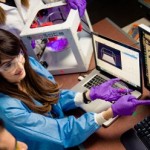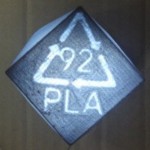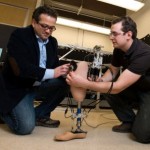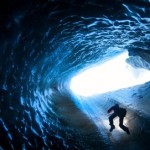 The printer looks like a toaster oven with the front and sides removed. Its metal frame is built up around a stainless steel circle lit by an ultraviolet light. Stainless steel hydraulics and thin black tubes line the back edge, which lead to an inner, topside box made of red plastic. In front, the metal is etched with the red Bio Bot logo. All together, the gray metal frame is small enough to fit on top of an old-fashioned school desk, but nothing about this 3D printer is old school. In fact, the tissue-printing machine is more like a sci-fi future in the flesh—and it has very real medical applications.
The printer looks like a toaster oven with the front and sides removed. Its metal frame is built up around a stainless steel circle lit by an ultraviolet light. Stainless steel hydraulics and thin black tubes line the back edge, which lead to an inner, topside box made of red plastic. In front, the metal is etched with the red Bio Bot logo. All together, the gray metal frame is small enough to fit on top of an old-fashioned school desk, but nothing about this 3D printer is old school. In fact, the tissue-printing machine is more like a sci-fi future in the flesh—and it has very real medical applications.
Read More
 Water is perhaps the most controversial natural resource in the US. Alex Mayer recognizes that, for all its controversy, water is essential to life and society. Mayer holds the Charles and Patricia Nelson Presidential Professor in civil and environmental engineering at Michigan Technological University and studies water resources. For his dedication to studying water quality and scarcity — and his unique approach to these complex problems — Mayer won Michigan Tech’s 2015 Research Award.
Water is perhaps the most controversial natural resource in the US. Alex Mayer recognizes that, for all its controversy, water is essential to life and society. Mayer holds the Charles and Patricia Nelson Presidential Professor in civil and environmental engineering at Michigan Technological University and studies water resources. For his dedication to studying water quality and scarcity — and his unique approach to these complex problems — Mayer won Michigan Tech’s 2015 Research Award.
Read More about this
 The watery world under winter’s ice is a mystery. It’s also a world full of sound. Now, as the days lengthen and the ice is retreating, researchers at Michigan Technological University are wrapping up their first winter season of underwater acoustic studies.
The watery world under winter’s ice is a mystery. It’s also a world full of sound. Now, as the days lengthen and the ice is retreating, researchers at Michigan Technological University are wrapping up their first winter season of underwater acoustic studies.
Learning more about acoustic properties underwater — and specifically under the ice — is important for designing acoustic communication networks and quiet underwater vehicles. These networks and vehicles have a range of applications. Environment monitoring is an example, encompassing everything from ice movement to the habits of aquatic critters to keeping tabs on chemical conditions.
 The 3-D printing revolution has changed the way we think about plastics. Everything from children’s toys to office supplies to high-value laboratory equipment can be printed. The potential savings of producing goods at the household- and lab-scale is remarkable, especially when producers use old prints and recycle them.
The 3-D printing revolution has changed the way we think about plastics. Everything from children’s toys to office supplies to high-value laboratory equipment can be printed. The potential savings of producing goods at the household- and lab-scale is remarkable, especially when producers use old prints and recycle them.
Read More
 Mo Rastgaar is poised to take a giant step forward in the development of a better prosthetic ankle.
Mo Rastgaar is poised to take a giant step forward in the development of a better prosthetic ankle.
The Michigan Technological University mechanical engineer and his team have already developed a prototype that can provide a range of motion that rivals a natural gait. Next, they aim to give their robotic ankle something different: eyes.
Read More
 Fluorescent bands of color outline the Great Lakes on a new, comprehensive map of the region’s coastal wetlands. This publicly available map is the first of its kind on such a broad scale — and the only one to trump political boundaries. Both Canadian and US wetlands are shown along more than 10,000 miles of shoreline.
Fluorescent bands of color outline the Great Lakes on a new, comprehensive map of the region’s coastal wetlands. This publicly available map is the first of its kind on such a broad scale — and the only one to trump political boundaries. Both Canadian and US wetlands are shown along more than 10,000 miles of shoreline.
The Great Lakes is an important focus of Michigan Technological University research. The coastal wetlands map is an extension of that focus, expanding on previous maps created through the Michigan Tech Research Institute (MTRI).
 Dr. Greg Odegard was recently presented wit the 2015 Exceptional Graduate Faculty Mentor Award from the Graduate School at the 2015 Graduate Research Awards Banquet. This Merit Award for Exceptional Graduate Student Mentor recognizes advocacy for graduate students, being available and encouraging to students, and creativity/interdisciplinary collaboration in new opportunities for graduate student.
Dr. Greg Odegard was recently presented wit the 2015 Exceptional Graduate Faculty Mentor Award from the Graduate School at the 2015 Graduate Research Awards Banquet. This Merit Award for Exceptional Graduate Student Mentor recognizes advocacy for graduate students, being available and encouraging to students, and creativity/interdisciplinary collaboration in new opportunities for graduate student.
 Soft spoken and with the wiry frame of an avid outdoorsman, Jason Gulley’s eyes light up when asked about caves. “They have a mystery around them,” he says. “Even with the oceans we know where the deepest parts are, but with caves, you never know how long or how hard it’s going to be to get where you’re going.”
Soft spoken and with the wiry frame of an avid outdoorsman, Jason Gulley’s eyes light up when asked about caves. “They have a mystery around them,” he says. “Even with the oceans we know where the deepest parts are, but with caves, you never know how long or how hard it’s going to be to get where you’re going.”

